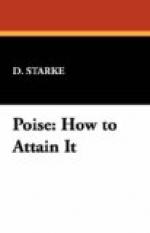In order to keep count of the time that is passing, as well as to keep control of one’s will-power, it is advisable to count aloud in such a way that approximately one second elapses between the naming of every two numbers.
When once fixity of gaze has been acquired, one can essay various other exercises, such as concentrating the eyes on an object and turning the head slowly to one side and the other without removing one’s gaze from this point for a moment.
It is not until one is very certain that the muscles of the eye have been thoroughly trained that one should undertake the mirror test.
To do this, one must take up a position in front of a glass and fix one’s gaze upon one’s own pupils for a time. Then one must transfer it to the bridge of the nose, between the two eyes, and must strive to keep it there immovably.
At first this exercise will not be found as easy as one might suppose. The magnetic power of the pupils is great and one will experience some slight difficulty in breaking away from it.
For this reason it is a good plan to count out loud slowly up to a predetermined number, at which point the gaze should be at once transferred to the bridge of the nose.
These exercises of the eye will be found particularly beneficial for people who are desirous of acquiring poise, as aside from the advantages we have specified, they have the effect of strengthening the will-power, which will be found to have materially gained by this means.
When the desired result appears to have been accomplished and one feels oneself strong enough to meet or to avoid another person’s eye, while at the same time one is conscious that one can dominate with one’s own, it will be well to experiment upon the people with whom one is closely associated.
One can thus become accustomed, little by little, to control one’s gaze, to force an estimate of its influence, and to neutralize the effect of that of other people.
THIRD SERIES—THE MOTIONS, THE CARRIAGE
Another highly important point in the conquest of poise is the struggle against awkwardness, which is at once the parent and the offspring of timidity.
Let us make ourselves clear.
Many people only lack poise because they fear ridicule of their obvious embarrassment and of the awkward hesitation of their movements.
Others fall into this embarrassment as the result of exhibitions of clumsiness in which they cover themselves with ridicule. The terror of renewing their moments of torture drives them into a reserve, from which they only emerge with a constraint so evident that it is reflected in their gestures, the evidences of a deplorable awkwardness.
It is exceedingly simple to find a remedy for these unpleasant conditions. One must make up one’s mind to combat their exhibitions of weakness by determining to acquire ease of movement.




